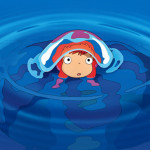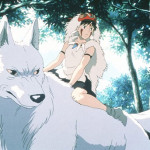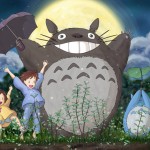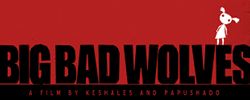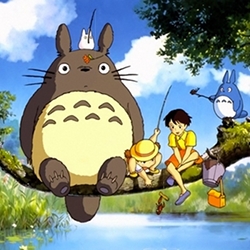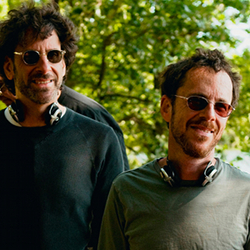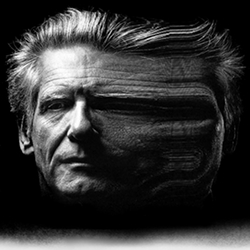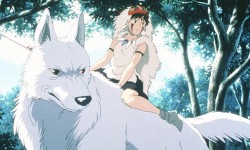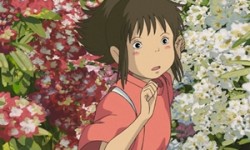
TIFF’s Spirited Away: The Films of Studio Ghibli Review: Spirited Away (2001) - NP Approved

Cast: Daveigh Chase, Suzanne Pleshette, Miyu Irino
Director: Hayao Miyazaki
Country: Japan
Genre: Animation | Adventure | Family | Fantasy
Editor’s Notes: The following review is part of our coverage for TIFF’s Spirited Away: The Films of Studio Ghibli which runs from December 12th to December 31st at TIFF Bell Lightbox. For more information on upcoming TIFF film series visit http://tiff.net and follow TIFF on Twitter at @TIFF_NET.
More than anyone since perhaps Walt Disney (and arguably more than even the Mouse King himself), Hayao Miyazaki understands the magic of imagination, the endless possibilities of childhood, and the emotional landscape of tentative maturation. Though Miyazaki has used the medium of animation to tell stories for all ages, he has never felt freer, bolder, or better than when he takes on childhood and reminds us all of the magic that surrounds us in the world. Spirited Away is a breathtaking act of world-building, a gorgeously realized realm in which Miyazaki can play out his fable on a canvas only he could fill in.
Hayao Miyazaki understands the magic of imagination, the endless possibilities of childhood, and the emotional landscape of tentative maturation.
Chihiro (Daveigh Chase in the English dub) is a timid girl, not quite over her anger at her parents, who are forcing her to move far out into the country. When the family discovers an abandoned theme park, Chihiro meets a boy who warns her to leave before nightfall. Her parents won’t listen, though, and soon night falls, trapping Chihiro in the spirit world, and turning her parents, who gorged themselves at a buffet, into pigs for their gluttony. In order to save herself and her parents, Chihiro must learn to be brave, responsible, persistent, and a person of integrity. The film’s premise is the stuff of standard animated fare, but what sets Spirited Away apart is the verve with which it is presented.

The film unfurls in a series of loosely tied episodic adventures as Chihiro explores the spirit world and learns of the ways it functions and the dangers it conceals. Chihiro is as precocious as any pint-sized hero must be, but she is fascinatingly authentic, always resonating as a real child in her sense of wonder, her fear, her frustration, and her stubborn determination. That she constantly feels like an actual child grounds the film around her, as she explores the bath house that is the spirit world. It is that world that raises Spirited Away above standard children’s films and into another realm entirely.
Miyazaki populates the spirit world with a wonderfully variegated cast of characters, giving it the feeling of the Moss Isley cantina from Star Wars writ across an entire world. Chihiro meets river dragons and frog-men, giants and beasts made of ooze, and most importantly, the witch Yubaba (Suzanne Pleshette), who steals names and, with them, memories. Though Miyazaki lets his imagination run wild, which occasionally takes him to some fairly dark places, the film is, at very turn, a story for children. It has emotional complexity in a way only Pixar has since matched, and is unafraid of exposing children to the pain, fear, and death that haunt us in our daily lives. Yet it is far more concerned with showing children that integrity, bravery, and honesty are eventually rewarded and that, with hard work and determination, good can triumph over evil.
Spirited Away is a kid’s movie, but it exists, like the children it aims to enchant, in a more adult space.
Spirited Away is the sort of children’s film that is equally resonant for audiences of all ages. It is weird, spooky, funny, and sad. The world in which Chihiro finds herself is situated somewhere between the sun-soaked innocence of Miyazaki’s early classics like My Neighbor Totoro and the grim desolation of his previous feature, Princess Mononoke, and in this middle ground, the director finds a sweet spot and delivers his greatest film. Spirited Away is a kid’s movie, but it exists, like the children it aims to enchant, in a more adult space. The film aims to teach children, but its most lasting lesson is that true progress is often scary and almost always hard-won. It exists in a magical realm that would rank among the most fully realized and gorgeously surreal in the history of the medium, but that world—like our own—does not make things easy, is not always fair, and can be scary and confusing for a child to inhabit. Spirited Away is a gorgeous, funny, surprisingly complex film directed with passion and style by Miyazaki. Beyond that, though, it is a simple parable about a little girl learning how to be a better person, and learning that sometimes the toughest lessons are the ones most worth learning, not in spite, but because of the hurdles they force us to overcome.
Related Posts
![]()
Jordan Ferguson
![]()
Latest posts by Jordan Ferguson (see all)


